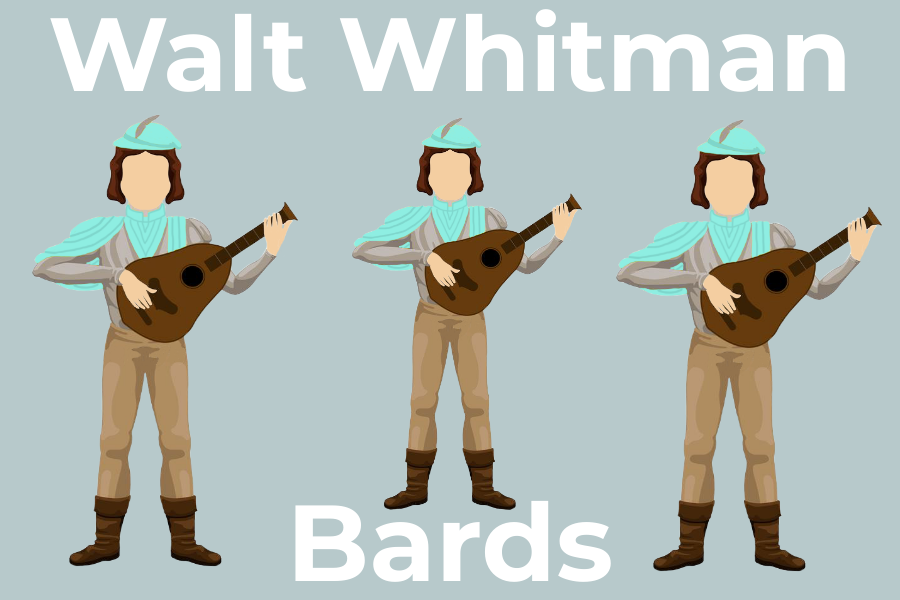The “Vikings” has to go: Whitman needs a new mascot
It’s long past time to stop equating teenagers to Vikings. Whitman needs a new mascot: the “Bards.”
November 12, 2021
A momentary hush falls over the crowd as the soccer ball rolls towards the goal; a playoff run is on the line. The ball squeaks past an outstretched goalie.
“Let’s go Vikes!” the crowd erupts. “Let’s go Vikes!” But, sitting in the stands, all I can think is, Let’s go, Bards!
A bard is a poet who typically writes in lyrical or impassioned verse. Many bards, like William Shakespeare, are widely regarded by historians as exceptional creative minds, sensational storytellers and, above all, trailblazers in making long-lasting social changes.
Whitman should replace our mascot and nickname, the “Vikings,” with the “Bards.” This new descriptor would align with our school’s namesake, Walt Whitman, and it would disconnect our community from a cultural group that took thousands of people into slavery in the 10th century.
“Walt Whitman” is an exceptional name for our school; it commemorates a storied poet who used his gifts to promote social advancements. Whitman, who lived from 1819 to 1892, was pro-democracy and anti-slavery. He wrote works that advocated for representative government, like his book Democratic Vistas. In his poetry, Whitman discussed controversial issues ranging from public health to women’s rights. He shed light on dilemmas that others often swept under the rug.
I am proud to go to a school named after Walt Whitman. However, the “Vikings” is a confusing nickname attached to the school with the sole purpose of making us seem more intimidating or “cool.”
Meaningful high school nicknames derive themselves from the educational institution’s namesake. These links signify consistency, which explains why many schools have mascots that fit with the figure the school is named after. For example, Winston Churchill High School students are the “Bulldogs” because Winston Churchill’s nickname was “The British Bulldog.” Magruder High School pupils are nicknamed the “Colonels” because the school’s namesake, Zadok Magruder, was a colonel.
Yet, Walt Whitman was not a Viking — he was a bard. In fact, Whitman’s nickname was the “Bard of Democracy.”
Some students have experienced confusion over the disconnection between Walt Whitman and our school’s mascot.
“I have always questioned why it was the ‘Whitman Vikings,’” junior Shreekanya Mitra said. “Vikings have no connection to the history of Walt Whitman. Changing the nickname is the logical answer.”
I, for one, don’t feel attached to being a “Viking” and have no connection to ancient Scandinavians. But if Whitman students’ collective name became one of passionate poets, I would embrace that identity with open arms. Each time I would hear this nickname, it would serve as a call to action — a reminder to use our individual power to help propel society forward like Walt Whitman did.
At best, a Viking mascot ignores the Vikings’ history, which is one of controversy. Although the Vikings completed many impressive feats during their existence, such as demonstrating prowess in architecture and engineering, they were far from perfect. They promoted slave trading in medieval Europe. They killed so many infant girls that they caused a gender imbalance in Scandinavia. They put a number of their slaves to death as part of a sacrifice for their owners. They championed a dueling system that some combatants used as a way to legally murder and rob others in parts of northern Europe. Many other ancient conquerors also committed horrifying atrocities, but that doesn’t make the Vikings’ acts any less significant.
It’s strikingly insensitive for a school mascot to represent a cultural group that perpetrated acts of brutality. Our school strives for equality and tolerance through programs like OneWhitman. Yet, the student body’s nickname contradicts these efforts. It’s irrefutably problematic to try to rally school spirit around a glorified group of slave traders.
Not all students are eager to adjust to a nickname change. However, even many of these Vikings, like junior Justin Yang, recognize the lack of a link between our school and our mascot.
“There is no reason for Whitman to be the Vikings,” Yang said. “Vikings don’t have a connection with Walt Whitman. He was a poet, not a Viking.”
We should no longer continue to overlook Walt Whitman’s legacy by equating high school students to Vikings. The school must instead reflect Whitman’s place in history with a term that matches a poet who fought for democracy and social justice. I hope that instead of yelling for an indefensible mascot, the masses in Whitman’s student section in the bleachers will one day cheer, “Let’s go, Bards!”












Sven Odinson • Jan 18, 2024 at 7:11 am
Do some real research on the Scandinavian culture before making child like remarks. This is disrespectful to all who are from there.
Asher • Nov 28, 2021 at 7:13 am
This is a very well-written article but I respectfully strongly disagree. A Viking is supposed to be a sign of power and people who worked hard to achieve what they wanted which is a good motto for the school and sports. Also, the truth is that we will never be able to change that the Vikings enslaved and killed people so I don’t think this should be a factor in the argument. Along with that, enslaving and killing were part of their culture so they never viewed it as wrong although it is now. In the end, the Vikings were tough and brave men and we have no control over what they did hundreds of years ago.
Go Vikes!
Asher • Nov 28, 2021 at 6:53 am
I respectfully strongly disagree. A Viking is supposed to be a sign of power and people who worked hard to achieve what they wanted which is a good motto for the school and sports. Also, the fact that they put people into slavery is something we will never be able to change and it was a normal part of their culture. The only thing we can do about that is making sure it never happens again because it is wrong but it was a part of life back then that shouldn’t be influencing the views on our great name because we can never change what the Vikings did hundreds of years ago. Go Vikes!
Juan Guaido • Nov 15, 2021 at 7:44 pm
Keep your chin up William, I love your stories. Even though they are the hottest of takes. I love poets. Vikings on the other hand are kind of awko taco. #bards4life #bardsarebeautiful
Anne • Nov 13, 2021 at 8:54 pm
This sounds exactly right. Thank you William!
Sarah • Nov 13, 2021 at 12:53 am
This is a stretch. It’s a no from me
charlotte • Nov 12, 2021 at 9:02 pm
i very much strongly disagree